

Australia's Automotive Manufacturing Industry (Current) - Australian Productivity Commission. Public inquiry This inquiry has concluded.

The final report was sent to Government on 31 March 2014. Australia's Automotive Manufacturing Industry (Current) - Australian Productivity Commission. The Smartest Machine On Earth. Economic Growth Given Machine Intelligence - Robin Hanson. The Lights in the Tunnel - Martin Ford. The Economic Implications of Intelligent Machines. Robin Hanson, a professor at George Mason University (who also blogs at Overcoming Bias), is one of the few economists who has given serious thought to the potential economic implications of intelligent machines.
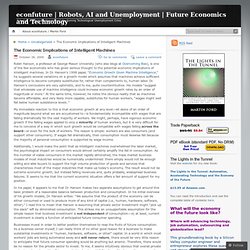
In Dr. Hanson’s 1998 paper, “Economic Growth Given Machine Intelligence,” he suggests several variations on a growth model which assumes that machines achieve sufficient intelligence to become complete substitutes for, rather than complements to, human labor. Dr. Brad Feld Reviews The Lights in the Tunnel. The Lights in the Tunnel. Review - The Lights in the Tunnel. I recently bought and read "The Lights in the Tunnel: Automation, Accelerating Technology and the Economy of the Future".
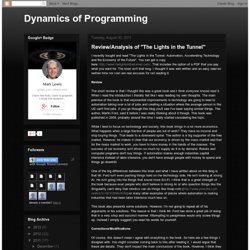
You can get a copy here: That includes the option of a PDF that you pay what you want for. The book isn't that long. I thought it was well written and an easy read so neither time nor cost are real excuses for not reading it. Review.
Ethical Issues In Advanced Artificial Intelligence. A Whole New Mind. * New York Times bestseller * BusinessWeek bestseller * Wall Street Journal bestseller * Washington Post bestseller.

The fall of the left brain is near. In your right mind: An interview with Daniel Pink - INTHEBLACK. The time has come for right-brain thinkers, says Daniel Pink | Photo: Damien Bredberg When the left hand doesn’t know what the right hand is doing, you know the company is in trouble. That tried and tested aphorism can also work on a personal level, where times are a-changin’ for “left brain-orientated” individuals such as accountants, lawyers and software engineers, who have ruled the professional roost for more than 50 years.
With even high-level technical work now being done by machines or outsourced to cheaper operations overseas, the future belongs to a person with a very different kind of mind, says Daniel Pink, contributing editor to Wired magazine and author of the popular and engaging book, A Whole New Mind: Moving from the Information Age to the Conceptual Age. Will Right Brain People Rule the Future? In the early 1960s, psychobioligist Roger W.

Why right-brainers will rule this century. Is Artificial Superintelligence Research Ethical? Recently I interviewed Roman Yampolskiy, Latvian born computer scientist at the University of Louisville, known for his work on behavioral biometrics, security of cyberworlds and artificial intelligence safety.
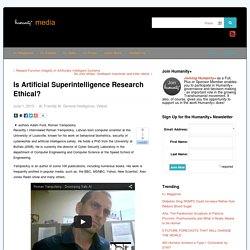
He holds a PhD from the University at Buffalo (2008). He is currently the director of Cyber Security Laboratory in the department of Computer Engineering and Computer Science at the Speed School of Engineering. Yampolskiy is an author of some 100 publications, including numerous books. Why we need an algorithm ethic. Ten years ago when the online industry was in its infancy, systems began delivering digital advertising that was individually customised according to specific criteria.
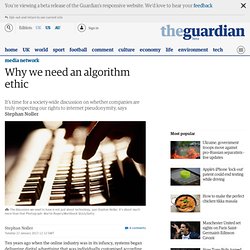
Today these algorithms make decisions up to 100,000 times per second as to who should and should not be shown advertising at any given instant. If we assume that within 10 years, at the latest, most people will prefer online information sources, then of course algorithms will become increasingly relevant. In the future, we will see newspapers being read on electronic devices, or consumed in chunks via streaming. Many readers will use tools based on algorithms together with editorial content, allowing them to customise the content to their individual interests. Even today, articles on sports reporting, politics or financial market developments are being created, added to and published by algorithms automatically. The Ethics of Artificial Intelligence. Artificial Intelligence Techniques Enhance Business Forecasts - Graziadio Business Review. Computer-based analysis increases accuracy.
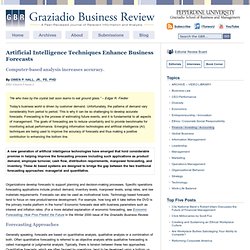
By Owen P. Hall, Jr., PE, PhD 2002 Volume 5 Issue 2. Research at i2. I.B.M. Puts Watson to Work in Business. Jon Simon/Feature Photo Service for IBMI.B.M.’s new Watson Engagement Advisor is being pitched as a smart assistant whose services can apply to most any industry.

Since its triumph over human “Jeopardy!” Champions two years ago, I.B.M.’s Watson has explored a number of frontiers for its artificial-intelligence technology, even inventing new recipes in the kitchen. To date, medicine has been Watson’s most focused foray. Its machine intelligence has read through vast troves of medical texts, research papers and patient records to suggest diagnosis and treatment options at institutions including the Cleveland Clinic, the Memorial Sloan-Kettering Cancer Center and the M.D. ## IBM Watson: The inside story of how the Jeopardy-winning supercomputer. Artificial-intelligence research revives its old ambitions. The birth of artificial-intelligence research as an autonomous discipline is generally thought to have been the monthlong Dartmouth Summer Research Project on Artificial Intelligence in 1956, which convened 10 leading electrical engineers — including MIT’s Marvin Minsky and Claude Shannon — to discuss “how to make machines use language” and “form abstractions and concepts.”
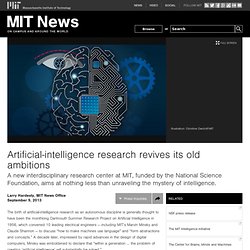
A decade later, impressed by rapid advances in the design of digital computers, Minsky was emboldened to declare that “within a generation ... the problem of creating ‘artificial intelligence’ will substantially be solved.” The problem, of course, turned out to be much more difficult than AI’s pioneers had imagined. In recent years, by exploiting machine learning — in which computers learn to perform tasks from sets of training examples — artificial-intelligence researchers have built special-purpose systems that can do things like interpret spoken language or play Jeopardy with great success. Of minds and machines. How Will Artificial Intelligence Affect Small Business? When will artificial intelligence change small businesses?
Virtual Assistant – humanlike artificial agents for self-service areas. A Virtual Assistant is an artificial humanlike representation of an organisation. It is designed for conversations with (potential) customers, members or civilians (audiences of organisations). A virtual assistant does not only answer questions - it also tries to hold a conversation, to manage dialogues on issues relating to the companies’ activities, or its offerings.
Typical usage.